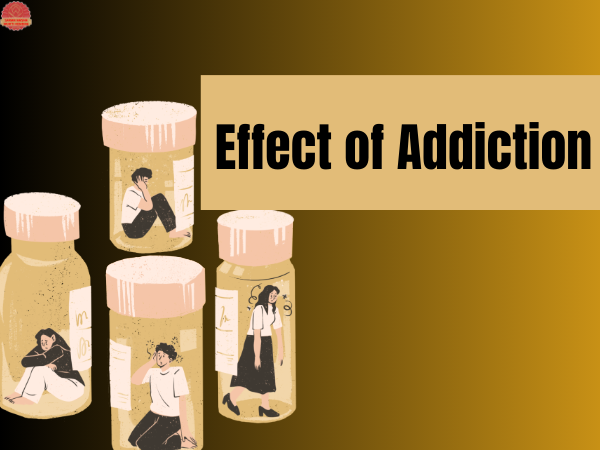How Does Alcohol and Drugs Affect Mental Health?
Addiction, whether it’s to substances like drugs and alcohol or behaviors like gambling and gaming, has profound and far-reaching effects on both physical and mental health.
Beyond the surface level of dependence lies a complex web of consequences that infiltrate every aspect of an individual’s well-being.
What Are the Effects of Drug Abuse on The Community?
Physically, addiction wreaks havoc on the body’s intricate systems, leading to deteriorating health, weakened immunity, and a heightened susceptibility to diseases.
It compromises vital organs, strains the cardiovascular system, and often results in irreversible damage. Moreover, the toll of addiction extends deeply into the realms of mental health, causing emotional distress, exacerbating pre-existing mental conditions, and triggering severe psychological disorders.
The Causes And Effects of Drug Abuse Among the Youth is not limited to the individual alone; it fragments families, strains relationships, and burdens communities.
Understanding the intricate interplay between addiction, physical health, and mental well-being is paramount in addressing this pressing issue, guiding both prevention efforts and the development of effective treatment strategies.
Effects of Addiction on Physical and Mental Health
Addiction can have profound and detrimental effects on both physical and mental health. It is a complex condition that can impact individuals differently, but some common effects include:
(A)Physical Health Effects:
Health Conditions:
Addiction to substances like drugs or alcohol can lead to a range of physical health problems, including cardiovascular issues, liver disease, respiratory problems, and an increased risk of infectious diseases like HIV/AIDS for those who inject drugs.
Nutritional Deficiencies:
Substance addiction Effects Of Drug Abuse in Schools often leads to poor dietary habits and neglect of nutritional needs, which can result in malnutrition, weight loss or gain, and related health issues.
Weakened Immune System:
Chronic substance abuse can weaken the immune system, making individuals more susceptible to infections and illnesses.
Tolerance and Withdrawal:
Over time, people develop tolerance to substances, requiring more of the substance to achieve the same effect.
When they try to quit or reduce their usage, they can experience withdrawal symptoms, which can be physically uncomfortable and even life-threatening in some cases.
Accidents and Injuries:
Impaired judgment and coordination caused by substance use can lead to accidents and injuries, which can have lasting physical consequences.
You can also read about >>> Foods to Eat During Withdrawal of Alcohol & more.
(B)Mental Health Effects:
Mood Disorders:
Substance addiction like Psychological Effects of Drug Abuse often leads to mood disorders such as depression and anxiety. The use of substances may temporarily alleviate these symptoms, but it can exacerbate them in the long run.
Cognitive Impairment:
Chronic substance use can impair cognitive function, affecting memory, attention, and decision-making abilities.
Psychosis:
Some substances, such as methamphetamine and hallucinogens, can induce psychosis, leading to hallucinations, delusions, and disorganized thinking.
Increased Risk of Suicide:
Individuals struggling with addiction are at a higher risk of suicidal thoughts and behaviors, especially when they experience the hopelessness and despair often associated with addiction.
Interference with Daily Life:
Addiction can interfere with daily life responsibilities, including work, relationships, and social interactions. This disruption can lead to stress, further contributing to mental health issues.
Dual Diagnosis:
Many individuals with addiction also suffer from co-occurring mental health disorders. This complicates treatment and can make recovery more challenging.
Isolation:
People with addiction often isolate themselves from friends and family, leading to feelings of loneliness and exacerbating mental health problems.
Loss of Self-Esteem:
Chronic addiction can erode an individual’s self-esteem and self-worth, further contributing to mental health issues.
It’s important to recognize What Are the Causes and Effects of Drug Abuse, and seeking help is essential.
Treatment options, including therapy, counseling, medication, and support groups, can help individuals manage addiction, mitigate its effects on physical and mental health, and work towards recovery.
Conclusion
effects of addiction on physical and mental health are far-reaching and often devastating. Substance abuse can lead to a multitude of physical ailments, including organ damage, infections, and a weakened immune system.
Moreover, it takes a heavy toll on mental health, causing anxiety, depression, and other serious psychological disorders. Addiction not only affects the individual but also has a profound impact on their relationships, work, and overall quality of life.
However, it’s important to remember that Solutions To Drug Abuse is possible.
With the right support, treatment, and determination, individuals can break free from the chains of addiction and begin the journey towards healing and rebuilding their physical and mental well-being.
At Saran Nasha Mukti Kendra, Best Nasha Mukti Kendra Patna we understand the challenges faced by those seeking recovery, and we offer a supportive and safe environment to foster healing and transformation.
Our experienced team of medical professionals, therapists, and counselors is committed to guiding you through every step of the recovery journey.




